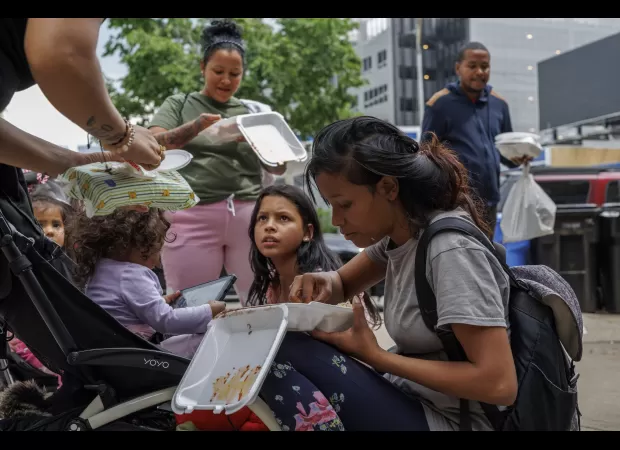Migrant shelter miscommunication causes concern and uncertainty.
Migrants unsure of housing and fate on deadline day, according to interviews at shelters in city.

Gladys Heredia, a 58-year-old grandmother from Peru, who also happens to be a diabetic, received some troubling news this week. She was informed by city officials that the migrant shelter she and her family have been staying at in Streeterville will be closing down on June 10th. This has left her feeling anxious and worried about her family's future.
Heredia, along with her daughter and 4-year-old granddaughter, arrived in Chicago in early May and have been staying at the Inn of Chicago shelter for the past 10 days. However, they were informed that they would have to leave and find alternative accommodations. Her daughter, Lizbeth, expressed her fear of being forced to live on the streets with her young child, where she could potentially face danger and harm.
Unfortunately, Gladys and her family are not the only ones going through this uncertainty. Many other families who have reached out to volunteers for assistance have also been informed that their shelters will be closing on June 10th. This news has caused a wave of worry and panic among the migrant community, as many of them have limited resources, cannot work legally, and do not have any family in Chicago to turn to for help.
The city officials have stated that they have no plans to close the shelters on June 10th, but have not provided any further information on how this decision was communicated. Cassio Mendoza, Mayor Brandon Johnson's deputy press secretary, stated that the policy has not changed since it was publicly announced on March 15th. However, this lack of clear communication has caused confusion and misinformation to spread among the migrants.
Veronica Castro, deputy director of the Illinois Coalition for Immigrant and Refugee Rights, who works closely with community-based organizations that assist migrants in shelters, has observed how quickly information, both accurate and inaccurate, can spread among the community. She emphasized the importance of clear and consistent messaging from the city, especially considering the traumatic experiences that many of these migrants have faced in their home countries.
The influx of tens of thousands of migrants coming to Chicago over the past two years has forced the city officials to make quick decisions and adapt to constantly changing situations. As a result, information may not always be effectively communicated, which can add to the stress and anxiety of an already vulnerable community. The city's response to the migrants has already cost $372 million, and maintaining the shelters has become increasingly expensive.
In an effort to reduce costs, Mayor Johnson enacted a policy in March that limits the stay of migrants in shelters to 60 days, unless they meet certain exemptions. Families with children registered in school were given three 30-day extensions, but the last extension will end on June 10th. This means that hundreds of families will be expected to leave the shelters and make their way to the city's "landing zone," a parking lot in the West Loop, where they will be provided with temporary emergency shelters.
This situation has caused a lot of stress and uncertainty for the migrants, as they will have to sleep on city-provided warming buses until further arrangements can be made for them. This can disrupt their assimilation into a new country and add to their already traumatic experiences. Bleidys Bonolli, a 40-year-old mother of three from Colombia, shared her concerns about the lack of clear information about reentering the system, while holding her 2-year-old daughter.
Aimee Hilado, a professor and expert on immigrant trauma, pointed out that the messages from the city, although necessary, are difficult for the migrants to hear and can add to their already stressful situations. Maria Perez, a volunteer with Southwest Collective, has also received messages from worried mothers who don't know where they will go with their children once the shelters close.
In the midst of all this uncertainty, Gladys Heredia stands outside the Inn of Chicago, recounting her journey from Peru with her daughter and granddaughter. She fled her home country after her family was threatened and attacked. She expressed her concern about not being able to afford a place to live, as she can barely afford to buy food for herself. However, not all migrants have lost hope. Anna Barra, a 55-year-old from Venezuela, believes that the city's plan to push people out of the shelters is a good thing, as some people have been relying on city services for months. She trusts that a door will open for her and her family.
In order to avoid further confusion and stress among the migrant community, Hilado suggests that the city should have hotlines or follow-up meetings to provide clarification after making announcements. She also emphasized the importance of considering the emotional and physical security of migrants who have gone through traumatic experiences and are currently in "survival mode." Clear and consistent messaging can help alleviate some of their fears and uncertainties about their future in a new country.
2 Views




